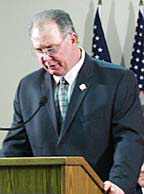Exercising his power as the speaker of the state assembly, Assemblyman and West New York Mayor Albio Sires (D-33rd Dist.) will force a vote on a bill for responsible stem cell research – despite opposition among some conservative groups throughout the state.
The bill, sponsored by Assemblyman Neil M. Cohen (D-20th Dist.) would allow for research involving the use of human embryonic stem cells and other cells derived from human embryos, within specific guidelines.
With stem cell research – which has spouted significant controversy around the country and state – human embryos are developed in a lab in order to study possible ways to cure a variety of diseases.
These cells are usually derived from excess human embryos created through in virtro fertilization procedures. Those embryos no longer needed can be donated to science for study in the lab.
Numerous conservative groups have protested the study, claiming these embryos constitute the earliest form of human life, even when they don’t come from eggs fertilized in a woman’s body.
Studies look at how an organism develops from a single cell and the process of how healthy cells replace damaged cells in adult organisms. They may be vital to developing cell-based therapies to teach such diseases as Parkinson’s disease, diabetes and heart disease.
Medical estimates show that 128 million Americans suffer from these crippling economic and psychological burdens of chronic degenerative and acute diseases. The legislation highlights the costs of treating them. The loss of these people’s productivity throughout the nation could be in the hundreds of billions of dollars, not to mention the extreme loss of human life and the suffering caused by the diseased.
What makes ‘stem’ cells differ
Stem cells have two important characteristics that distinguish them from other types of cells. Because they are formed at the earliest part of the human development process, they hold the key to regeneration of heart cells, blood-making cells in the bones and oxygen carrying cells. While stem cells do not operate in this early stage in those capacities, they somehow choose to become one of these types of working cells. Scientists are hoping that through intense study, they can learn how these cells make that transformation they can later breed cells to repair damaged cells.
“Human stem cell research offers immense promise for developing new medical therapies for these debilitating diseases and a critical means to explore fundamental questions of biology,” Cohen’s bill says. “Stem cell research could lead to unprecedented treatments and potential cures for Alzheimer’s disease, cancer, diabetes, Parkinson’s disease and other diseases. The United States has historically been a haven for open scientific inquiry and technological innovation; and this environment, combined with the commitment of public and private resources, has made this nation the pre-eminent world leader in biomedicine and biotechnology.”
Sires said he is 100 percent behind the passage of this bill.
“I think this is something very important and should not be left to linger in committee,” he said during a telephone interview. “This bill could make a big difference in many people’s lives.”
The bill goes on to say that “Stem cell research, including the use of embryonic stem cells for medical research, raises significant ethical and public policy concerns; and, although not unique, the ethical and policy concerns associated with stem cell research must be carefully considered; and the public policy of this state governing stem cell research must: balance ethical and medical considerations, based upon both an understanding of the science associated with stem cell research and a thorough consideration of the ethical concerns regarding this research.”
Assemblywoman Joan Quigley (D-32nd Dist.) said although the hospital network for whom she works full-time does not favor this research, she does. She intends to vote in favor of the bill.
“I’m coming out very strongly for this bill,” she said, noting that the bill does not force anyone to donate embryos. “Those people undergoing fertility treatments have an option to donate the excess embryos to science. The research done could eventually lead to the regeneration of diseased kidneys and in the treatment of other diseases.”
Quigley pointed out that these additional embryos would otherwise be destroyed or frozen for possible future use.
Although President George W. Bush did authorize some research in this area, the federal version does not allow scientists the same range of options. States may sent up different standards than the federal government. Federal policy restricts access to certain discarded embryos, often at a point too late for meet the needs of research. A three- to five-day embryo has a small group of cells that have yet to develop into specific use cells.
“I think it’s important for people across the country,” said Hoboken Councilman Tony Soares, who is a strong advocate for stem cell research, last week. “I’m glad to see the New Jersey Assembly is taking a lead in this. We’re not talking about babies here; we’re talking about cells in a Petri dish. Unused cells from embryos may be able to let a person walk or see.”
Growing cells in the laboratory is know as cell culture. The human embryonic stem cells are isolated by transferring the needed cells into a plastic laboratory dish that contains a nutrient broth. The cells divide and spread over the surface of the dish.
Paul Byrne, a local political consultant and someone whose eyesight has suffered due to diabetes, will be meeting with Gov. Jim McGreevey in the near future to discuss the legislation.
“The governor called me to have lunch with him and his chief of staff,” Byrne said.
